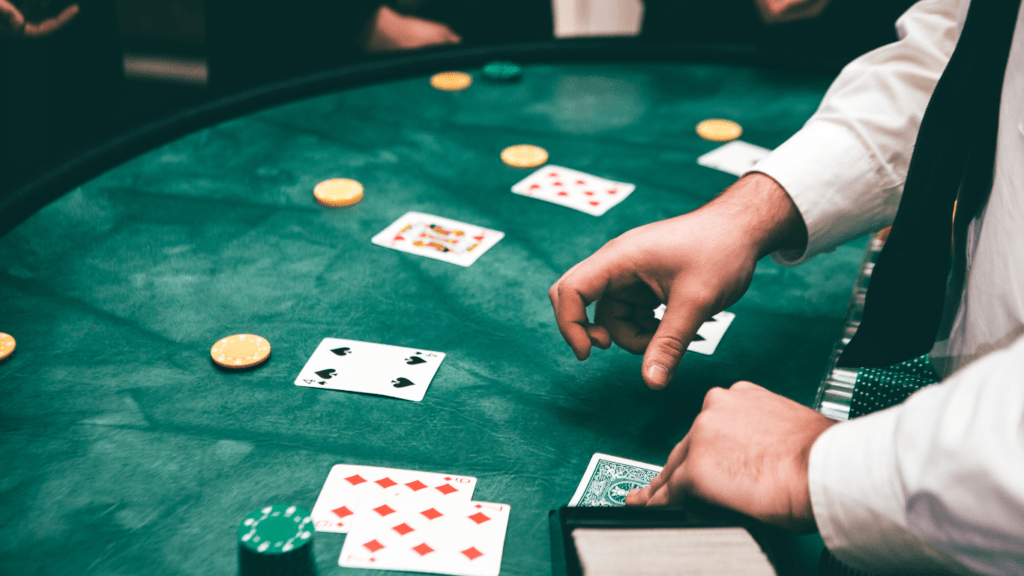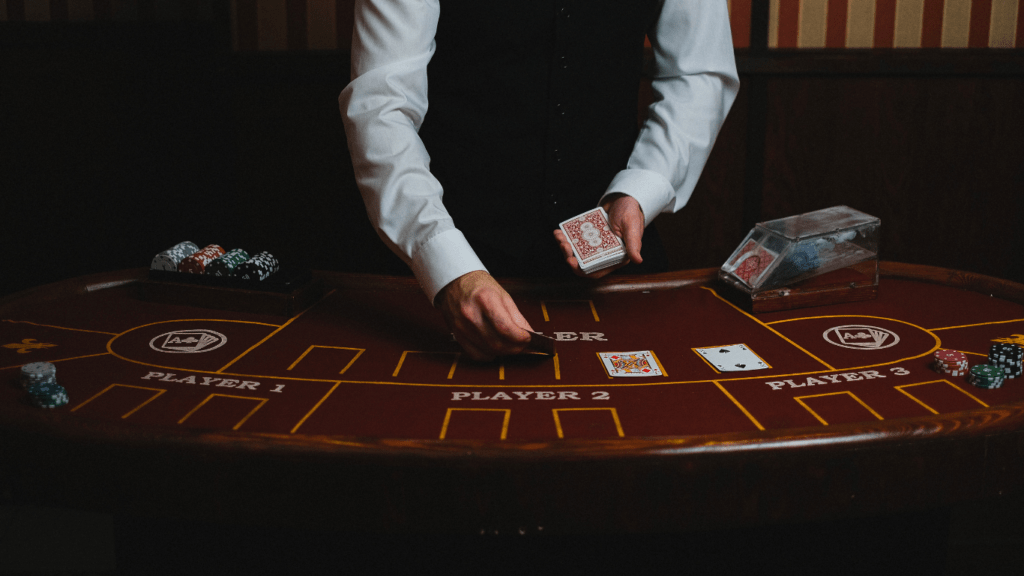Understanding Blackjack
Blackjack offers a dynamic experience rooted in probability and strategic decision-making. It attracts players who thrive on quick thinking and simple yet compelling rules.
Basic Rules of Blackjack
In blackjack, the game’s primary objective is to beat the dealer’s hand without exceeding 21. Players receive two cards initially, and they can choose to “hit” to draw more cards or “stand” to keep their current total. Aces count as 1 or 11, face cards as 10, and all others as their numeric values. If a hand exceeds 21, it’s a “bust” and results in a loss. The dealer plays by strict rules, usually “hitting” until reaching a total of 17 or more. Players can also opt to “double down,” “split” pairs, or “surrender” certain hands for strategic gameplay.
Common Strategies in Blackjack
Effective blackjack strategies enhance a player’s ability to win against the dealer. One popular approach, card counting, involves tracking high- and low-value cards played to predict future hands. Basic strategy charts provide mathematical guidance on when to hit, stand, split, or double down based on the player’s total and dealer’s upcard. Another strategy, betting systems like the Martingale, adjusts bets based on outcomes to capitalize on winning streaks. Consistency and adaptability in these strategies increase long-term success.
Exploring Poker
Poker appeals to players who thrive on skill and psychological insight. By understanding poker’s different variants and strategies, one can better engage with its complexity.
Poker Variants and Basic Rules
Poker features various formats that challenge players uniquely. The most popular variants include:
- Texas Hold’em: Players receive two hole cards and share five community cards, aiming for the best hand.
- Omaha: Similar to Hold’em but players get four hole cards, using exactly two with three community cards for their best hand.
- Seven-Card Stud: Each player receives seven cards, some face-up and others face-down, to form the best five-card combination.
Each variant has distinct rules, bets, and hand rankings. For instance, in Texas Hold’em, the game includes rounds like the flop, turn, and river.
Popular Poker Strategies
Success in poker often requires applying various strategies. Key approaches include:
- Bluffing: Misleading opponents to think your hand is better or worse than it is, influencing their decisions.
- Position Play: Capitalizing on your seat at the table, using later positions to gather information on opponents’ intentions.
- Bankroll Management: Ensuring a sustainable playing balance by setting limits and avoiding emotional decision-making.
Employ these strategies with awareness of opponents’ tendencies and the chosen poker variant. Understanding when to adjust tactics based on the game dynamics can significantly impact outcomes.
Comparing Blackjack and Poker

Blackjack and poker, both exciting casino games, cater to different player preferences. First, let’s explore their skill requirements.
Skill Requirements
- Blackjack prioritizes decision-making and probability analysis.
- Players use strategic actions like hitting or standing to influence game outcomes.
- The primary skill involves executing optimal strategies swiftly.
- Poker involves a complex skill set, combining psychology, strategy, and patience.
- Success depends on reading opponents, bluffing effectively, and adapting strategies based on evolving game situations.
House Edge and Player Odds
Blackjack generally offers a lower house edge compared to poker. For skilled players, using basic strategy reduces the house edge to around 0.5%. This makes it appealing to those seeking favorable odds.
Poker’s odds are less predictable; they rely heavily on other players’ skills. Unlike blackjack, where players compete against the dealer, poker involves playing against other individuals, making personal skill a critical factor.
Social Interaction and Atmosphere
Blackjack offers a straightforward, fast-paced experience with little interaction, focusing on personal strategy against the dealer’s hand. It’s suitable for players who prefer an individual gaming environment.
Poker provides a rich social experience. Engaging with fellow players is integral to the game, fostering a competitive atmosphere. Players looking for social interaction and dynamic gaming will find poker appealing.
Financial Considerations
When deciding between blackjack and poker, understanding the financial aspects of each game is crucial. Blackjack and poker both offer unique betting structures and profit potentials.
Typical Bets and Costs
In blackjack, minimum bets typically range from $5 to $25 per hand, depending on the casino or table. Players make decisions rapidly, which can lead to frequently changing costs. For instance, doubling down or splitting pairs requires additional bets equal to the original wager. This can increase the overall cost per round if strategic opportunities arise.
Poker usually involves a different betting system. In cash games, the blinds set the minimum stake, which can vary. Tournaments, on the other hand, have a fixed buy-in cost, which offers a defined risk level. For example, a Texas Hold’em tournament might cost $50 to enter with no further financial risk beyond this initial fee.
Potential for Profit
Blackjack boasts a lower house edge, often as low as 0.5% when using basic strategy, which means better odds for skilled players. By minimizing house advantage, players can potentially increase their net gains over time, although outcomes in each session can still be influenced by short-term variance.
Poker rewards skill and psychological acumen, offering potentially higher profits for adept players. Here, the house doesn’t compete against you directly; winnings depend on cashing in at tournaments or besting other players in cash games. Successfully reading opponents and mastering game tactics can lead to substantial earnings, with top poker players profiting significantly from consistent wins and strategic gameplay.
Personal Preferences
Personal preferences play a pivotal role in choosing between blackjack and poker. Understanding one’s comfort with risk and time commitment helps determine the most enjoyable casino experience.
Risk Tolerance
For risk tolerance, blackjack attracts those who prefer structured risks with lower variance. Given the quick rounds and strategic moves, I enjoy the controlled environment and consistent odds. In contrast, poker provides a higher risk-reward ratio, perfect for players like me who relish outmaneuvering opponents. The social interactions and variable outcomes make poker intriguing yet riskier.
Time and Patience Required
When considering time and patience, blackjack suits me if I favor short, fast-paced sessions. It offers the chance to make quick decisions and see immediate results. For a game requiring more time and patience, poker demands sustained focus and long-term strategy. It’s ideal for individuals like me who thrive on reading others and bide my time for maximum advantage.



 Ella Rowell brought creativity and expertise to Gamble Dynasty Wins, helping develop engaging and insightful content across various betting sectors. Her dedication to delivering accurate and timely updates has been instrumental in making the platform a trusted resource for its audience.
Ella Rowell brought creativity and expertise to Gamble Dynasty Wins, helping develop engaging and insightful content across various betting sectors. Her dedication to delivering accurate and timely updates has been instrumental in making the platform a trusted resource for its audience.